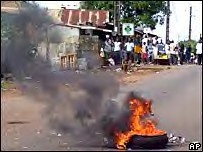
Civil unrest in Guinea has been taking place for months. Lansana Conte has ordered a crackdown on striking workers who have paralyzed the leading Bauxite industry in this west African nation.
Originally uploaded by Pan-African News Wire File Photos.
Guinea police kill 23 in worst day of strike violence
Police shot dead 23 protesters across Guinea, raising to 33 the death toll in almost two weeks of a general strike and demonstrations against President Lansana Conte's rule, medical and union officials said.
At least 169 have been recorded injured across the country.
The death toll makes Monday the bloodiest day in the strike that started on January 10 at the call of labour unions.
With 18 dead and 140 wounded, the capital Conakry recorded the largest number of deaths.
"About 10 of the wounded are in a critical condition and could die soon considering our lack of resources," said a source at one of the capital's two largest hospitals.
In Kankan town east of the country, three demonstrators were killed and 22 wounded, among them seven seriously and in neighbouring Siguiri, two protestors were also shot dead while seven were injured, said Mamadi Conde, Kankan regional secretary general of the National Confederation of the Workers of Guinea (CNTG).
Several labour union leaders behind the open-ended strike which has paralysed Guinea, were arrested Monday evening by members of the presidential guard, a union official said.
The crackdown by authorities has left UN chief Ban Ki-moon "gravely concerned at the excessive use of force" by government troops in the former French colony.
Several opposition parties have called for the release of the unionists in the third mass strike in 12 months in this poverty-stricken west African country.
The protest, organised by powerful labour unions and backed by 14 opposition parties, began on January 10 over endemic corruption and interference in the judiciary by Conte after he freed two associates facing trial for embezzlement.
Strike leaders then demanded that Conte, who has been in power for the past 23 years, be constitutionally removed by the Supreme Court on the grounds that he is too unwell to hold office.
Michele Montas, spokeswoman for the UN secretary general, said Ki-moon wanted an official probe of the deadly clashes with opponents of Conte's rule.
Several thousand people also took to streets of the central towns of Pita and Dabola and at Telemele in the north, demanding an end to the rule of the 72-year-old head of state, who is suffering from chronic diabetes, witnesses said.
Protesters want a new broad-based government to take over, demanding the naming of a prime minister to fill a post left empty since April and form a government of national unity as a condition for lifting the strike call, labour leader Mamadou Alpha Barry said.
Conte on Saturday dismissed union demands calling on the military to back his government, a day after sacking his number two, minister for presidential affairs Fode Bangoura, and giving Planning Minister Eugene Camara more responsibility.
Sekou Konate, the secretary general of Conte's ruling party, on Sunday described the strike as "a political insurrection"
The UN chief urged the Conakry administration and parties concerned "to engage in dialogue" to seek "a peaceful solution to the dispute."
A meeting planned for Monday between the unions and authorities failed to take off due to the violence.
Mediation by the presidents of Senegal and Nigeria, Abdoulaye Wade and Olusegun Obasanjo, acting for the 15-nation Economic Community of West African States, has been postponed by a few days at the request of Conakry.
Obasanjo has, according to his spokeswoman, not yet decided if and when to embark on the mediation mission to Guinea.
Guinea has in recent years been mired in a social, economic and political crisis with Conte's failing health raising fears of a power vacuum in the event of his death.
Conte has run the west African country since a bloodless military coup in 1984. He was twice hospitalised last year in Switzerland.
No comments:
Post a Comment